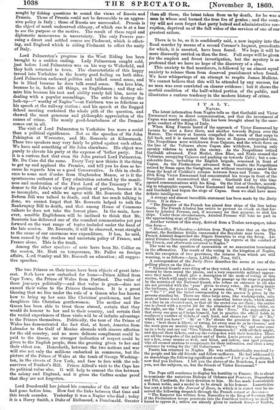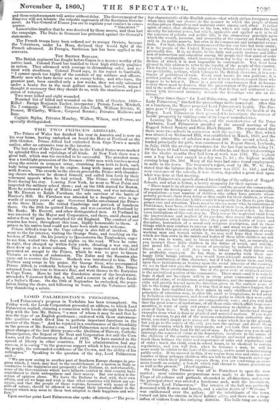IT ALY.
NAPLES.
The latest information from Naples tells us that Garibaldi and Victor Emmanuel were in direct communication, and that the investment of Capua was nearly complete. This has been brought about by the ener- getic conduct of the King of Italy.
When King Francis heard of the approach of Victor Emmanuel by Isernia he sent a force there, and another towards Bojana over the Matese. The victory at Isernia compelled the wreck of that corps to fall back, and it is assumed that the force at Bojana retrograded also. The Neapolitans were withdrawn from-Cajazzo, and the whole force on the line of the Volturno above Capua also withdrew, leaving only cavalry videttes to watch the enemy. As the Neapolitans retired Garibaldi advanced. First Medici, then Eber, and Nixio crossed the Volturno, occupying Cajazzo and pushing on towards Calvi ; but a con- siderable force, including the English brigade, remained in front of Capua. As the Piedmontese advanced from Venafro the Neapolitans retired by Besse upon the Garigliano, not without receiving a smart blow from the head of Cialdini's column between Sessa and Team. On the 29th King Victor Emmanuel had concentrated his troops in front of the Garigliano and reconnoitred that river. Garibaldi had by this time opened communications with his King. On the 31st of October, accord- ing to telegraphic reports, Victor Emmanuel had crossed the Garigliano, and Garibaldi had begun the siege of Capua. Soon we shall have more definite intelligence.
A strange and almost incredible statement has been made by the Daily News. It is this-
" The Emperor of the French has placed four ships of the line before Gaeta. The French Admiral has orders to prevent an attack on that for- tress by Admiral Persano, and, if necessary for that purpose, to sink his ships. Under these circumstances, Admiral Persano will take no part in the approaching siege of Gaeta."
Another version of this story, derived from a Toulon newspaper, takes this form—
"Marseilles, Wednesday.—Advices from Naples state that on the 27th instant, the Sardinian flotilla cannonaded the Royalists near Gaeta. The French Admiral despatched the frigate Descartes to stop the firing. Ad- miral Persano thereupon retired, expressing his regrets at the conduct of the French, and afterwards returned to Naples." The vote on the question of annexation or no annexation terminated in the affirmative. The result of the voting in the kingdom of Naples, with the exception of two provinces, the returns from which are still wanting, is as follows—Ayes, 1,102,499; Noes, 9371.
A correspondent of the Daily News describes the scene at one of the polling places on the 21st-
" National Guards were filing off as they voted, and a hollow square was formed by them round the piazza, and a very respectable military appear- ance they made. I shall give a description of the mode of voting at this station, which will apply to the others. The passage up the steps is guarded by the sentries of the National Guard, who refuse an entrance to all who are not provided with the • pass' given to every voter. On getting inside the inelosure, the pass is taken, and a person asks, Will you vote " Si" or "No " ? ' and the ticket corresponding to the answer is given by the persons standing by. There are three large urns, like washing-tubs' only made of better wood and turned out in somewhat better style, which stand in a line in an elevated spot, so that all the crowd can see them ; the centre one is closed with a narrow lid for the admission of the tickets, whilst, on the right, are the ' Sis' and on the left the Noes.' fhe supposition is that every one goes and helps himself, but in practice the officer holds in readiness a number of tickets of each kind, and shouts out Si' or No,' which will you have?' ' Si' or No' shouts the president from time to time ; here there is liberty of voting, let every man do as he chooses,' and the work goes on merrily enough. Every one takes a 'Si,' and some come up in a body and cry out Viva Vittorio Emmanuele! ' with all their might, and deposit their tickets, and rap the voting-box with their knuckles. There are all the renegades of the palace and of Santa Lucia present, and priests not a few, some monks as well, and blind, and infirm, and aged persons, who all seemed anxious to compensate for their infirmities, and close a long existence by voting for the 'Re Galantuomo.' " Poerio has returned to Naples. He was enthusiastically received by the people and his old friends and fellow-sufferers. He had addressed to an assemblage the following significant words—" I left you Neapolitans, I now find you Italians. I left you the slaves of the Bourbons, I now find you, not the subjects, no, but the friends of Victor Emmanuel."
Eons.
The Pope still continues to display his hostility to France. He is about to nominate the notorious Bishops of Orleans and Poictiers, Dupanloup and Pie, Cardinals, for their devotion to him. He has made Lamoriciere a Roman noble, and a medal is to be struck in his honour. Lamoricikre has sent a letter to the Journal of _Rome, in which it is stated that he re- ceived the following despatch through the French consul at Ancona- " The Emperor has written from Marseilles to the King of S ,rdinia that if the Piedmontese troops penetrate into the Pontifical territoty he shall be forced to oppose it ; orders are already given to embark troops at Toulon,
and those reinforcements will arrive without delay. The Government of the Emperor will not tolerate the culpable aggression of the Sardinian Govern- ment. As Vice-Consul of France you are to regulate your conduct in conse- quence. Lamoriciere implies that he was deceived by those means, and thus lost the campaign. The Duke de Gramont has protested against the General's statements.
The French troops have been ordered not to occupy Orvieto, because the Volunteers, under La Mass, declared they would fight if the French advanced. At Perugia, Sardinian law has been applied to the convents.
THE BRITISH BRIGADE.
The British regiment has fought before Capua in a manner worthy of its native land. Colonel Peard has testified to their high shldierly qualities in action. They advanced with courage in skirmishing order, and re- tired with steadiness. Colonel Peard says, in his report to Garibaldi, "I cannot speak too highly of the conduct of my soldiers and officers. Mostly men who have never seen an enemy before, and who have, the greatest part, been enrolled only a few weeks, they not only advanced under a heavy fire in the most gallant manner, but retired, when I thought it necessary that they should do so, with the steadiness and pre- cision of veterans."
Two were killed and eight wounded.
Nominal list of killed and wounded on the 19th of October, 1860— Killed; Ensign Benjamin Tucker, interpreter ; Private Lewis Mitchell, No. 7 company. Wounded : Privates John Clark, William Ritchie, G. Prosser, M'Carthy, Wilson; Corporal Rennet; Privates Mathews and Bate.
Captain Styles, Privates Monday, Walker, Wilson, and Prosser, are specially distinguished.



























 Previous page
Previous page